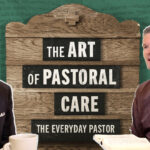The following quotes caught my attention as I read Jen Wilkin’s new book Ten Words to Live By: Delighting in and Doing What God Commands (Crossway, 2021). For a limited time, it is on sale for only $7.49 through the TGCW21 bookstore.
The first word [she uses this synonymously with “commandment”] serves as the umbrella statement for the other nine. If we obeyed the first word, we would automatically obey the others. (28)
The second word portrays idol worship as progressive: do not make, do not bow down, do not serve. The second word portrays idol worship as contagious, causing trouble for generation after generation. The second word portrays God as zealous for his glory: deeply committed to being worshiped as he deserves. His jealousy is right and righteous because it is inflamed by the denial of what is rightly his. (34)
Any time we take the attributes of the gods the world around us worships and apply them to God to make him more palatable and less threatening, more accommodating and less thunderous, we produce a graven image. We whittle down his transcendence, we paint over his sovereignty, we chisel away his omnipotence until he is a pet-like version of the terrible pagan god we would never be so foolish as to bow down to. (39)
To misuse the name of the Lord—to take his name in vain—is to misrepresent the character of God. . . . Doing so misuses his reputation to suit our own ends, speaks of or to him without accuracy or due respect, and miscredits him for self-serving actions done in his name. To misuse the name of God is to commit an act of defamation against Yahweh himself. (49–50)
More than the deliberate cessation of work for the purpose of decompressing, Sabbath is the deliberate cessation of any activity that might reinforce my belief in my own self-sufficiency. In contrast to cultural ideas of rest marked by self-care, Sabbath rest is marked by self-denial. (65)
There is no such thing as a noncommunal sin, and there is no such thing as a noncommunal obedience. . . . Personal sin always results in collateral damage. . . . Personal obedience always results in collateral benefit. (68)
We remember the letter of the Sabbath command by resting from labor. We remember the heart of the Sabbath command by laboring for the rest of others. (70)
The fifth word is the hinge point in the Decalogue at which the discussion of showing honoring moves from God (1–4) to human authorities (5) to one another (6–10). . . . The Ten Commandments deal with matters of heavenly submission, earthly submission, and mutual submission—in that order. (76, 77)
Because the church is the family of God, we need be at no loss for fathers and mothers to honor. Nor need we be at a loss for spiritual orphans to parent. If your family of origin was a painful one, the family of God can be a haven and a recompense. If your family of origin was a happy one, how much more so the family of God? (83)
It is not just the pace that changes with the sixth word, but the focus. Having given five exhortations to honor God and elders, the Ten Words now turn their attention to the business of honoring one another as fellow image bearers. We progress from discussion of how we relate to our heavenly Parent, to our earthly parents (human authorities), to our brothers and sisters (our neighbors). Essentially, the last five words will speak to the proper treatment of siblings. (89–90)
Contempt may win followers, but it is not pastoral. It masquerades as righteous anger, but it is, in fact, self-serving and self-elevating. It may make a point, but it always has a victim. (96)
Lust itself is an act of contempt, reducing someone to a source of sexual gratification and nothing more. If the sixth command prohibited regarding our neighbor as expendable, the seventh prohibits regarding our neighbor as consumable. (102)
Satan has succeeded in convincing believers that lust is just something to be managed instead of something to be slain. (105)
Our offending eyes and hands and feet and ears and lips and tongues and noses serve at the pleasure of our hearts. What our hearts delight to do, our members rush to accomplish. (106)
Delight yourself in lawlessness, and your disordered desires will govern you. Delight yourself in the Lord, and he will give you new desires. (109)
There are two ways of living: as a taker or as a giver. When it comes to matters of wealth, do you perceive yourself as a terminus or a distribution point? If a terminus, you will labor without rest to acquire that which you cannot keep. If a distribution point, you will labor to give away that which was never truly yours to begin with. When we hear others praying for their daily bread, does it occur to us that we might be the means by which that bread is supplied? (120)
While flattery, silence, and misattribution are the subtle pickpockets of reputation, reviling stands in the lobby of First Reputation Bank spraying bullets and sacking the vault. In the modern church, perhaps nothing attests more to our current levels of biblical illiteracy than our casual, thoughtless, and frequent commission of the sin of reviling. (128)
When the good name of our neighbor is run through the mud, the silence of his friends can be as brutalizing as the reviling of his enemies. We must not use the command to be slow to speak as an excuse for never speaking (James 1:19). God help us if we claim to be wise in our silence, when in fact we are masking cowardice. . . . There are times when we are unsure whether to speak or remain silent. But if we know our words are needed and yet withhold them, we are as guilty of bearing false witness as the reviler who began the lie. . . . Who trades in sinful silence? Satan. He likes nothing better than the silence of those who know they should speak. When we silence truth-tellers, or remain silent ourselves when called to speak courageously, we conform to Satan’s image instead of to the image of Christ. When false witnesses speak against our neighbor, we must speak up to bear true witness on their behalf. (131, 132–33)
Idol-making, Sabbath-breaking, dishonoring authority, murder, theft, adultery, and slander can all be identified by an onlooker, but not so covetousness. Covetousness hides in the heart. The Ten Words progress from “Don’t do it” to “Don’t say it” to “Don’t even think about it.” (139–40)
The Bible provides us a lengthy cautionary tale about comparison to our neighbor. We might title it “Keeping Up with the Canaanites.” It shows us that Israel as a whole soon forgot the tenth word in a rush to compare with her neighbors. In a scene that reads like a middle schooler asking for the latest pair of shoes, Israel asks God to give her a king like the other nations. God decides to teach his people contentment the hard way, by giving them what they want. (144)
The great loss of a covetous life is that it keeps love of self as our primary concern. . . . What is more like Satan than to want what belongs to another? (147)
“The Most Practical and Engaging Book on Christian Living Apart from the Bible”
 “If you’re going to read just one book on Christian living and how the gospel can be applied in your life, let this be your book.”—Elisa dos Santos, Amazon reviewer.
“If you’re going to read just one book on Christian living and how the gospel can be applied in your life, let this be your book.”—Elisa dos Santos, Amazon reviewer.
In this book, seasoned church planter Jeff Vanderstelt argues that you need to become “gospel fluent”—to think about your life through the truth of the gospel and rehearse it to yourself and others.
We’re delighted to offer the Gospel Fluency: Speaking the Truths of Jesus into the Everyday Stuff of Life ebook (Crossway) to you for FREE today. Click this link to get instant access to a resource that will help you apply the gospel more confidently to every area of your life.

































